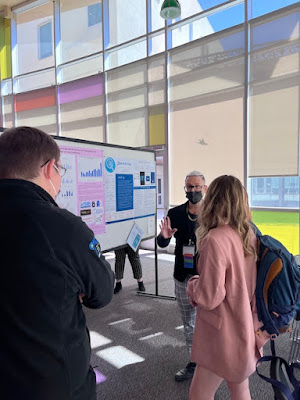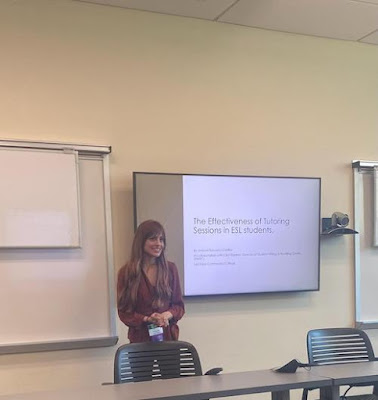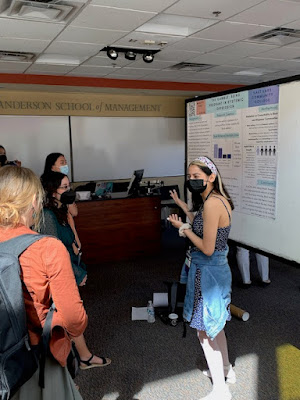 |
| Left to right: Michael Young, Jared Gomez, Kathy Tran-Peters, Kati Lewis, Manette Perez, and Jessica Ducuara. |
Salt Lake Community College Honors program students Jessica Ducuara, Jared Gomez, and Manette Perez presented research at the Western Regional Honors Conference on April 8-10. SLCC was one of three community colleges that presented at the conference in Albuquerque, New Mexico. Honors student Jevahjire France was also accepted to present but could not attend. Instead, France plans to present their research entitled “Educational Equity for English Language Learners” at the National Collegiate Honors Council Conference in November 2022.
The Honors program’s cohort model allows students to interact and form relationships through faculty and peer mentoring. The program also promotes student learning by ensuring students experience three High Impact Practices (HIPs). One HIP is undergraduate research, giving Honors students the chance to develop transferable skills like critical thinking, problem-solving, communication and collaboration.
Social work major Jared Gomez ('23) shares that learning the process of sourcing, reading, and annotating scholarly articles in the Honors program was instrumental in helping them throughout the research process. As a non-traditional student in “every sense of the word,” having access to professors, staff, advisors, and resources was a major reason Gomez was interested in enrolling at SLCC. Gomez says their experiences in the Honors program have been validating, and their contributions valued. “As a person who occupies multiple intersections and not having a word for that [while] growing up, you’re just weird,” shares Gomez. “Within the Honors program, specifically, I see people that look like me … and, to me, it is really important to have representation.”
English major Jessica Ducuara ('22) shared similar sentiments about the program and considers it a “wonderful place to learn.” As someone who hopes to teach one day, Ducuara believes that she must have a strong foundation in theory and fundamentals to instruct her future students. The support Ducuara received in the program helped her realize her potential and embrace the possibilities of research. Ducuara says, “Thanks to [the Honors program], I could improve things for myself, professionally and personally.”
Biotechnology major Manette Perez ('23) shares that the communal learning environment motivated her to easily learn from fellow cohorts, faculty, and mentors. “People here want to support each other and get to the point where they know, ‘Yes, I can prosper. Yes, I am growing. Yes, I can succeed,’” shares Perez. “It’s such a cool culture [at] SLCC.”
All three Honors students chose research questions that came up from a personal experience or the experiences of their community, highlighting the need for research from diverse identities and thinkers.
Gomez’s research, entitled “The Barriers of Accessing Gender Affirming Care and Reproductive Justice for Transgender and Gender Non-conforming People of Color in America,” focuses on the roadblocks transgender and gender-nonconforming people of color face in the United States’ health care system. One barrier is the lack of cultural competence in the medical industry, says Gomez. This lack of awareness puts transgender folks in a difficult position where they may feel like they must engage in re-traumatizing experiences like handholding — providing careful support or guidance to someone during a learning process — their medical provider.
Jessica Ducuara, who moved to Utah from Bogotá, Colombia, four years ago, also explored a research question related to her personal experiences. Entitled “Analyzing How Practical Are the Writing Tutoring Sessions for ESL Students,” Ducuara explored the effectiveness of tutoring for ESL students. “When you are automatically thinking in your language throughout your life, it makes me feel very insecure in the moment to request for help,” says Ducuara.
Ducuara said that as an ESL student, there were times during a tutoring session when she did not understand the tutor or felt nervous asking questions. “I say, ‘Okay, what I’m going to say is going to sound stupid,’” shares Ducuara. “‘I’m probably not going to understand because I don’t understand them well.’ And I feel ashamed.” Through her research, Ducuara found that other ESL students shared similar experiences. She plans to transfer to a four-year institution to complete a second bachelor’s degree and develop her research.
In Perez’s research entitled “The Gamble: Pregnant in Systemic Oppression,” she explores the issue of medical racism. Perez decided to hone her focus on the experiences of expecting mothers through the medical system. The U.S. currently has a very high maternal mortality rate for every demographic, especially Black and Indigenous women, says Perez. Perez also looked at community-based organizations that address and attempt to reduce the issue. She shares that society must come together for the U.S. to address this serious issue. “It’s like the seed metaphor,” says Perez. “If we just hack the weed, it won’t kill off the weed. We have to disrupt the system to change it.” She, like her cohort, plans to build on the research after transferring to UVU to obtain a bachelor’s degree in biotechnology.
Perez says she gained a lot from working in a learning environment and seeing others’ presentations at the conference. Working with students with varying experiences, identities, and knowledge provided Perez a sense of comfort. She shares that the cohort was always there for one another and shared many discussions on their projects and personal lives.






Comments
Post a Comment